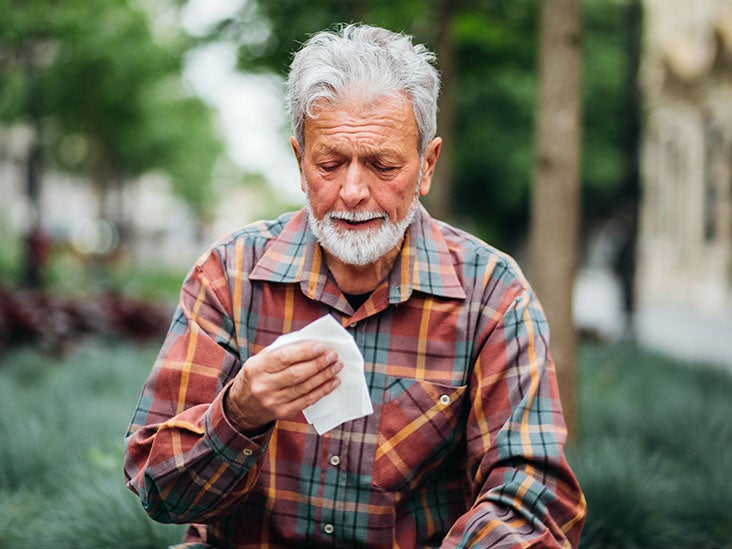Is Emphysema Communicable or Noncommunicable? Causes and Risks - Healthline

Emphysema is a type of chronic obstructive pulmonary disease (COPD) that occurs when air sacs in the lungs become damaged. The disease affects more than 3 million people in the United States.
Smoking is the number one cause of emphysema, but there are other risk factors.
Unlike a cold or the flu, which are considered communicable illnesses, emphysema is a
This article will explain how emphysema develops, why it doesn't spread from one person to another, and how to treat and prevent the disease.
The simple answer is no. Being around someone with emphysema doesn't increase your risk of developing the disease.
For example, if someone with emphysema coughs around you and doesn't have another sickness, you won't be at risk of developing a cough. You can't "give" emphysema to anyone else.
However, if someone with emphysema develops an infection, such as the common cold, the infection itself may be contagious, just like it would be in any other case.
Also, secondhand smoke exposure can cause emphysema. So, if you're around someone who smokes heavily, you could be at increased risk of developing it.
Emphysema develops due to damage to the air sacs and lung tissue. The damage is usually caused by some type of trigger, such as smoking. It's not a contagious disease.
Emphysema happens when there's damage to the walls between the tiny air sacs in your lungs.
Normally, these sacs, called alveoli, are flexible and stretchy. They expand and fill with air when you breathe in and shrink and deflate when you breathe out.
When the air sacs are damaged, it's harder for your lungs to move air out of your body.
Some symptoms of emphysema include:
Most of the time, smoking is the reason someone develops emphysema. Smoking destroys lung tissue and irritates airways.
But research suggests that up to
Other risk factors for emphysema can include:
- exposure to environmental irritants, such as air pollution, secondhand smoke, workplace pollutants, biomass fuels, or other chemicals
- having an inherited condition called alpha-1-antitrypsin deficiency emphysema
- having small airways in relation to your lung size
There's no cure for emphysema, but treatments and lifestyle changes can help relieve symptoms and improve your quality of life.
Doctors will first recommend that you quit smoking, if you smoke. This is the most important way to protect your lungs from further damage.
Treatment options for emphysema may include:
- Pulmonary rehabilitation: You'll learn breathing techniques and other ways to lessen symptoms and improve your ability to exercise.
- Bronchodilator medications: These medications can help relax the muscles around your airways.
- Anti-inflammatory medications: These drugs help lessen inflammation in the airways, which may make it easier to breathe.
- Antibiotics: Because infections are common in people with emphysema, antibiotics may be prescribed in some cases.
- Oxygen: Some people with emphysema may need to use a machine that delivers oxygen through a nasal catheter or a mask.
- Nutrition counseling: Nutrition experts can help you modify your diet so that you can get the right nutrients or gain or lose weight as needed.
- Lung volume reduction surgery: With this procedure, surgeons remove a portion of the diseased lung tissue and connect the remaining tissue together. Your doctor can tell you whether you're a candidate for lung volume reduction surgery.
- Lung transplant: In severe cases where other methods have failed, a lung transplant may be an option. With this procedure, doctors replace your diseased lung with a healthy lung from a donor.
If you have emphysema, experts recommend getting annual flu and pneumonia vaccines, COVID-19 vaccines, and taking measures to avoid getting respiratory infections. This includes:
- washing your hands frequently
- wearing a face mask during cold and flu season
- avoiding other people who are sick
Because smoking causes most cases of emphysema, the best way to prevent the disease is not to smoke or to quit smoking.
Other prevention measures include:
- avoiding exposure to secondhand smoke
- staying away from air pollution, chemical fumes, dust, and other respiratory irritants
- wearing a face mask to protect your lungs if you work around dust, fumes, or irritating chemicals
Emphysema is a lung disease that can make breathing more difficult. People with emphysema often experience a cough, wheezing, tiredness, and shortness of breath.
Emphysema isn't contagious and can't be spread from one person to another. You can't "catch" this disease like you can with a common virus. Most people develop emphysema because they smoke or have smoked in the past.
Although there's no cure for this lung disease, several treatment options are available to help people with emphysema manage their symptoms and live better.

Comments
Post a Comment